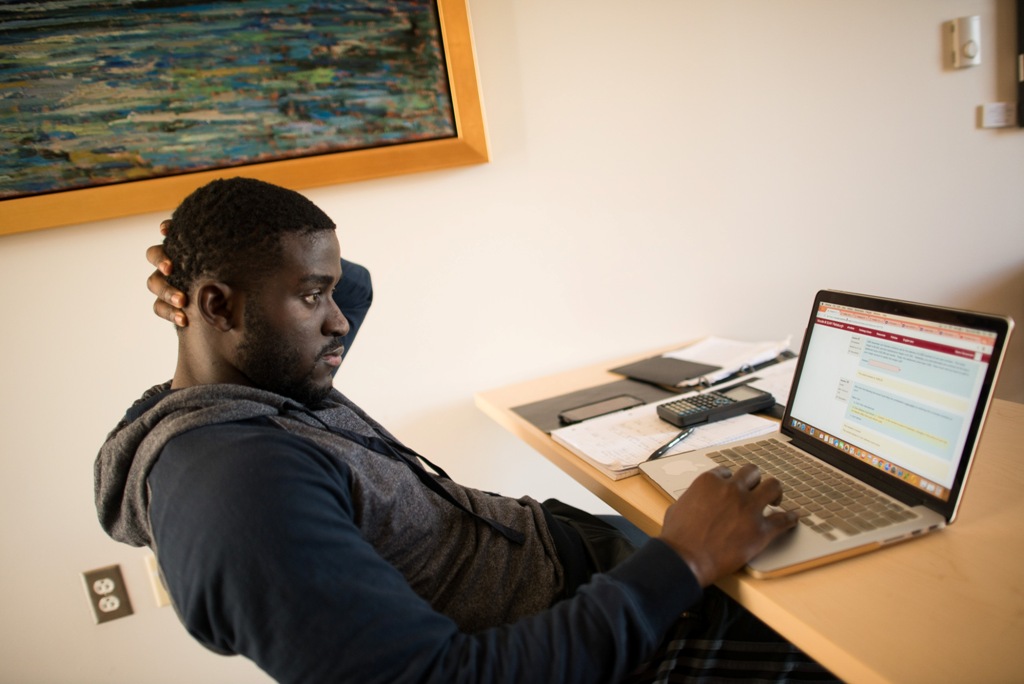Tips to Keep Your Work, Technology Safe and Secure

Students, faculty and staff alike can benefit from taking extra care online while working and studying from home — now and in the future.
Data theft has long been a problem in our expanding technological world. Here, Mark Mastrean, communications and marketing associate in library and information technology services, and Cristian Balan, lecturer, center for cybersecurity and technology, offer tips on how to protect yourself and your technology.
- Be aware when downloading and installing malware, either from email, infected websites, social media, app stores or even USB drives.
“We are all looking for the next piece of software that will help us do our work better,” Balan said. “There are so many advertisements for cheap software that inadvertently, the average user will fall prey to the social engineering used to get one to click on a link. Check these links and make sure they are from a reputable organization.”
- Be on high alert for phishing and work-from-home scams.
“These threats are growing fast, as criminals commonly take advantage of world-wide events to perpetrate them,” Mastrean said.
- Encrypt all mobile devices.
“Encryption locks your files and data away using a secret code,” Mastrean said. “It applies to data we have stored on our devices and data we send through the internet. Use strong passwords on all devices.”
- Keep your operating system updated.
“Some of the Windows updates, while automatic, need our help to restart the computer and to actually run these updates,” Balan said. “The same is true for a Mac or chrome book. Check each week to make sure you have the latest updates. Pay attention to prompts by your operating system that it needs to restart to install an update. Check to see if you have the latest version or Windows 10.” Turning your computer off at night or allowing it to go to sleep does not mean these updates automatically happen. “You need to make sure they run the next morning,” he said.
- Save all work and documents to the Cloud.
“We assume that our computers are always going to work and be ready for us when we want to do work,” Balan said. “Not so. Computers break, hard drives fail and data is not necessarily safe. I recommend saving all work and documents to the Cloud. All schoolwork should be uploaded to Google Drive.”
- Enable firewall protection on all devices.
“Make sure that your antivirus software is installed and up to date,” Mastrean said. “Be extra care when using a computer that isn’t yours.”
- Secure your home router.
“Regularly install updates and change default passwords; set your router encryption to WiFi Protected Access 2 or 3. Be sure to disable WPS,” Mastrean said.
- Update your router.
“Older, outdated routers have vulnerabilities,” Balan said. “If your router is more than three years old, and you’ve never updated the software, you may have a vulnerable device protecting your home network. Outdated home-monitoring devices can be cameras, baby monitors, environmental monitors and controllers that are all open to the internet and able to be used remotely on your mobile device.”
- Lock your devices when not in use.
“Other members of your household should not have access to any devices you are using for your coursework,” Mastrean warns. “Mobile devices have particularly high risk for theft, so always practice good physical security with them.”
And Balan offers more tips:
- Give your devices some TLC by updating every week
- Clean out your downloads folder
- Clean your computer desktop by moving files to Document
- Upload all important files to Google Drive
- Avoid plugging in others’ USB drives; use your own or buy a new one
- Limit browser plugins you install
- Contact the Helpdesk at 518-564-4433 or email [email protected] if your system slows down, you are getting popups or unwanted web pages, of if you have any questions on keeping your computer and your work secure.
News

SUNY Adirondack Students Benefit from New Dual Agreement with SUNY Plattsburgh Queensbury

SUNY Recognizes Two Plattsburgh Seniors for Excellence in Academics, Leadership
